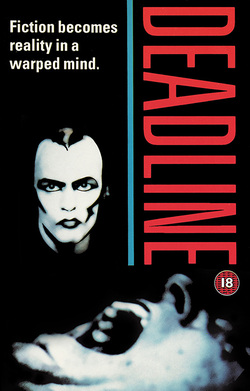Deadline (1983)
An eighties Canadian tax-shelter project actually worth watching, Deadline chronicles two weeks in the life of Steven Lessee, a horror film scriptwriter grown weary of churning out generic genre exercises. His concentration wracked by his emotionally neglected children and cheating, coked-out wife, Lessee struggles to deliver a script demanded by a sleazy agent-producer all too willing to accept any garbage so long as it's profitable. Despite the agent's protestations, you see, Lessee strives to have his work taken seriously.
Deadline intersperses Lessee's horrific daydreams with gruesome highlights from his films, and juxtaposes these bloody visions with the turbulence of his increasingly disastrous marriage. As he grows ever more frustrated with the limitations of his creative capabilities, Lessee begins to realize that the most authentic horror is the downward spiral of his own miserable life. When real life tragically imitates the spectres of his febrile imagination, Deadline careens towards its inevitable conclusion.
Deadline intersperses Lessee's horrific daydreams with gruesome highlights from his films, and juxtaposes these bloody visions with the turbulence of his increasingly disastrous marriage. As he grows ever more frustrated with the limitations of his creative capabilities, Lessee begins to realize that the most authentic horror is the downward spiral of his own miserable life. When real life tragically imitates the spectres of his febrile imagination, Deadline careens towards its inevitable conclusion.

A morose slog through a landscape of hateful encounters between unlikeable characters, including its mean-spirited writer protagonist, Deadline is not likely to fit anyone's definition of "fun" viewing. As played by television veteran Stephen Young, Steven Lessee is Stephen King via Rupert Pupkin, a tragic figure whose grandiose illusions of fame are dashed by bitter circumstance: a broken marriage, hostile public criticism, and the pervasive suggestion that his fantasies are a blot on the fabric of social well-being.
That Lessee ultimately becomes a victim of his own morbid imagination seems to suggest that Deadline is intended as a diatribe against the horror genre. Another take might be that the writer's sick fantasies are direct and rational responses to the mental anguish he suffers from being trapped between marketplace demands and critical condemnation.
Though it comes up well short of being a classic, Deadline earns respect for having more on its mind than many of its eighties' low-budget horror brethren. If only more care had been taken in writing the dialog, which at key moments sounds stilted or contrived. The lead actors do their best to inhabit the clumsily crafted lines, but it's an uphill climb. Stephen Young, who had previously appeared with John Candy in the kidnap saga The Clown Murders (1975), portrays the tormented scribe as an unsympathetic egotist whose ambitions outweigh his talent . As his bored, acerbic wife, Sharon Masters convinces enough to lead one to wonder why her film career was so brief and inconsequential. Most recognizable among the accomplished child actors is Cindy Hinds of David Cronenberg's The Brood (1979) as Lessee's young daughter.
That Lessee ultimately becomes a victim of his own morbid imagination seems to suggest that Deadline is intended as a diatribe against the horror genre. Another take might be that the writer's sick fantasies are direct and rational responses to the mental anguish he suffers from being trapped between marketplace demands and critical condemnation.
Though it comes up well short of being a classic, Deadline earns respect for having more on its mind than many of its eighties' low-budget horror brethren. If only more care had been taken in writing the dialog, which at key moments sounds stilted or contrived. The lead actors do their best to inhabit the clumsily crafted lines, but it's an uphill climb. Stephen Young, who had previously appeared with John Candy in the kidnap saga The Clown Murders (1975), portrays the tormented scribe as an unsympathetic egotist whose ambitions outweigh his talent . As his bored, acerbic wife, Sharon Masters convinces enough to lead one to wonder why her film career was so brief and inconsequential. Most recognizable among the accomplished child actors is Cindy Hinds of David Cronenberg's The Brood (1979) as Lessee's young daughter.
 Mario Azzopardi
(The Malta Independent)
Mario Azzopardi
(The Malta Independent)
Director and screenwriter Mario Azzopardi, who made films in his native Malta before migrating to Canada, has since worked mostly in television, though he's also known for the Rutger Hauer thriller Bone Daddy (1998), the commune-set shocker Savage Messiah (2002), and films seen in the U.S. on the Lifetime Channel. He's currently at work on the biblical dramatization Acts of the Apostles: Saul. With Deadline, his North American feature film debut, Azzopardi crafted a grim and gruesome warning about the inherent dangers of the unchecked imagination. The message may be open to interpretation, but Deadline remains a unique look into the dark side of the creative process.
Deadline was originally marketed in the U.S. on Paragon Video with two different cheesy sleeves, the most common depicting bloodied fingers and typewriter keys. It is currently unavailable on DVD. Used VHS copies of Bloodline may be found on sale through online auctions, or view it in its entirety on YouTube, below.
Deadline was originally marketed in the U.S. on Paragon Video with two different cheesy sleeves, the most common depicting bloodied fingers and typewriter keys. It is currently unavailable on DVD. Used VHS copies of Bloodline may be found on sale through online auctions, or view it in its entirety on YouTube, below.
[This review originally appeared, in different form, in ecco, the world of bizarre video, Volume One, Number One.]